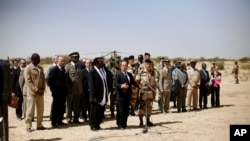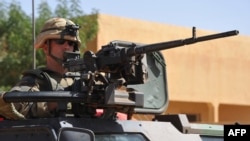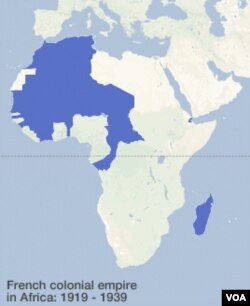PARIS —
A month after mounting a military operation to help Mali crush Islamist extremists, France says it will shortly begin a drawdown of its forces -- and is pushing for an international peacekeeping force in Mali as early as April. Some observers say the Mali intervention symbolizes a changed French relationship with Africa -- and the presidency of French leader Francois Hollande.
After struggling with sinking polls at home, French President Francois Hollande got a boost overseas last week, during a triumphant visit to Mali.
Speaking to cheering crowds in Bamako, Hollande said January's decision to deploy troops to drive out Islamist extremists in Mali came in response to demands of the Malian government and the international community -- and was critical in the fight against terrorism in West Africa.
African analysts say France's intervention in Mali may count among the hallmarks of Hollande's presidency. The politician with little African experience is now known by Malians as "Papa Hollande."
Frederic Lejeal, chief editor of the Paris-based publication La Letre du Continent, is also among those who believe it symbolizes a dramatic change in the old, so-called "France-Afrique" -- a relationship once marked by lack of clarity, cronyism and questionable business ties.
Lejeal said since Hollande came to power, he has been trying to normalize relations with France's former colonies, by reporting to parliament and sending missions to Africa with clearly defined goals. While the change began with President Hollande's predecessors, Lejeal says, Hollande is offering his own branding that highlights human rights -- although French business interests in Africa also shape policy.
French forces intervened during the leadership crisis in Ivory Coast in 2011 and provided intelligence and logistic support to Chad's President Idriss Deby as his army battled rebels in 2008.
For the Mali operation, France has pushed for a multilateral face that includes soliciting support from Europe and the U.S. While President Hollande says French troops will stay as long as necessary, Paris is pushing for a West African intervention force to take over as soon as possible. Now, officials are outlining a new phase.
Speaking to reporters in Paris on Wednesday, Foreign Minister Laurent Fabius said France may begin drawing down its estimated 4,000 French troops in Mali starting next month. Those staying would shift their goals to routing out remaining pockets of extremists in the North.
And Fabius suggested that the West African force could turn into an international peacekeeping one under the U.N. umbrella as early as April.
For now, President Hollande is not only drawing cheers in Mali but also at home. Polls show the majority of French support the Mali operation.
That includes retiree Yves Naviere who lives in the Brittany village of Ereac. France knows Africa better than other countries, he says, so it makes sense it should send forces to Mali.
But experts caution these sentiments may change swiftly if French troops stay too long and body bags start coming home.
Lejeal says that's one reason why Hollande is pushing for an African face to the operation. And, he says, the French president believes Africa should manage its own problems.
The government estimates the price tag so far for its Mali intervention at more than $90 million -- but there may be other costs. France has notched up its security at home, for fear of retribution. Earlier this week, police arrested four people outside Paris suspected of having links with extremists in the Sahel area of west and central Africa. More than half-dozen French hostages are also being held in the Sahel -- and their fate may hinge on France's next moves in the region.
After struggling with sinking polls at home, French President Francois Hollande got a boost overseas last week, during a triumphant visit to Mali.
Speaking to cheering crowds in Bamako, Hollande said January's decision to deploy troops to drive out Islamist extremists in Mali came in response to demands of the Malian government and the international community -- and was critical in the fight against terrorism in West Africa.
African analysts say France's intervention in Mali may count among the hallmarks of Hollande's presidency. The politician with little African experience is now known by Malians as "Papa Hollande."
Frederic Lejeal, chief editor of the Paris-based publication La Letre du Continent, is also among those who believe it symbolizes a dramatic change in the old, so-called "France-Afrique" -- a relationship once marked by lack of clarity, cronyism and questionable business ties.
Lejeal said since Hollande came to power, he has been trying to normalize relations with France's former colonies, by reporting to parliament and sending missions to Africa with clearly defined goals. While the change began with President Hollande's predecessors, Lejeal says, Hollande is offering his own branding that highlights human rights -- although French business interests in Africa also shape policy.
French forces intervened during the leadership crisis in Ivory Coast in 2011 and provided intelligence and logistic support to Chad's President Idriss Deby as his army battled rebels in 2008.
For the Mali operation, France has pushed for a multilateral face that includes soliciting support from Europe and the U.S. While President Hollande says French troops will stay as long as necessary, Paris is pushing for a West African intervention force to take over as soon as possible. Now, officials are outlining a new phase.
Speaking to reporters in Paris on Wednesday, Foreign Minister Laurent Fabius said France may begin drawing down its estimated 4,000 French troops in Mali starting next month. Those staying would shift their goals to routing out remaining pockets of extremists in the North.
And Fabius suggested that the West African force could turn into an international peacekeeping one under the U.N. umbrella as early as April.
For now, President Hollande is not only drawing cheers in Mali but also at home. Polls show the majority of French support the Mali operation.
That includes retiree Yves Naviere who lives in the Brittany village of Ereac. France knows Africa better than other countries, he says, so it makes sense it should send forces to Mali.
But experts caution these sentiments may change swiftly if French troops stay too long and body bags start coming home.
Lejeal says that's one reason why Hollande is pushing for an African face to the operation. And, he says, the French president believes Africa should manage its own problems.
The government estimates the price tag so far for its Mali intervention at more than $90 million -- but there may be other costs. France has notched up its security at home, for fear of retribution. Earlier this week, police arrested four people outside Paris suspected of having links with extremists in the Sahel area of west and central Africa. More than half-dozen French hostages are also being held in the Sahel -- and their fate may hinge on France's next moves in the region.







